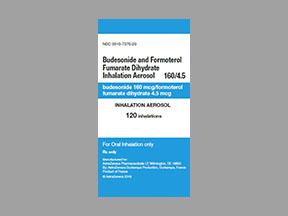
Breyna Coupons & Savings Card – Discount Prices from $97.09
Brand for: Budesonide-formoterol
My prescription
Edit
10.2GM of 160-4.5MCG/ACT, Budesonide-formoterol (1 Inhaler)
Select pharmacy

CVS
$159.78
COUPON PRICE
Walgreens
$97.09
COUPON PRICE
Walmart
$216.71
COUPON PRICE
Albertsons
$221.32
COUPON PRICEBreyna savings card
Show this card to your pharmacist
Walgreens
$97.09
BIN
ID
PCN
GRP
015995
LHKPX311762
GDC
DR33
Powered by
More prescriptions for copd
More prescriptions for copd
Price history for Breyna (brand) & Budesonide-formoterol (generic)
1 Inhaler, 10.2GM of 160-4.5MCG/ACT
Average retail price for Breyna
Average retail price for Budesonide-formoterol
Average SaveHealth price for Budesonide-formoterol
Our price history data is based on aggregated prescription data collected from participating pharmacies in America. Our prescription data updates daily to reflect the latest price changes. If you notice a missing data point, it means there wasn't sufficient data available to generate a monetary value for that date.
Over the last 12 months, the average discount price of Breyna is $169.04 using the SaveHealth savings card. That's an average savings of 26.14% on Breyna with our discount card.
*Retail prices are based on pharmacy claims data, and may not be accurate when we don't have enough claims.
Breyna (Budesonide-formoterol) dosage forms
Dosage Quantity Price from Per unit 10.2GM of 160-4.5MCG/ACT 1 Inhaler $216.71 $216.71 10.2GM of 80-4.5MCG/ACT 1 Inhaler $190.76 $190.76 10.2GM of 80-4.5MCG/ACT 2 Inhalers $372.53 $186.26 10.2GM of 80-4.5MCG/ACT 3 Inhalers $551.62 $183.87 10.2GM of 80-4.5MCG/ACT 4 Inhalers $730.49 $182.62 10.2GM of 80-4.5MCG/ACT 9 Inhalers $1624.85 $180.54 10.2GM of 160-4.5MCG/ACT 2 Inhalers $425.16 $212.58 10.2GM of 160-4.5MCG/ACT 3 Inhalers $633.96 $211.32 10.2GM of 160-4.5MCG/ACT 6 Inhalers $1252.92 $208.82 10.2GM of 160-4.5MCG/ACT 10 Inhalers $2078.20 $207.82
| Dosage | Quantity | Price from | Per unit |
|---|---|---|---|
| 10.2GM of 160-4.5MCG/ACT | 1 Inhaler | $216.71 | $216.71 |
| 10.2GM of 80-4.5MCG/ACT | 1 Inhaler | $190.76 | $190.76 |
| 10.2GM of 80-4.5MCG/ACT | 2 Inhalers | $372.53 | $186.26 |
| 10.2GM of 80-4.5MCG/ACT | 3 Inhalers | $551.62 | $183.87 |
| 10.2GM of 80-4.5MCG/ACT | 4 Inhalers | $730.49 | $182.62 |
| 10.2GM of 80-4.5MCG/ACT | 9 Inhalers | $1624.85 | $180.54 |
| 10.2GM of 160-4.5MCG/ACT | 2 Inhalers | $425.16 | $212.58 |
| 10.2GM of 160-4.5MCG/ACT | 3 Inhalers | $633.96 | $211.32 |
| 10.2GM of 160-4.5MCG/ACT | 6 Inhalers | $1252.92 | $208.82 |
| 10.2GM of 160-4.5MCG/ACT | 10 Inhalers | $2078.20 | $207.82 |
What is the drug Breyna used for?
Breyna is used for the maintenance treatment of asthma and chronic obstructive pulmonary disease (COPD). It helps to control and prevent symptoms such as wheezing and shortness of breath.
What is the purpose of Breyna?
Breyna is used for the maintenance treatment of asthma and chronic obstructive pulmonary disease (COPD). It helps to control and prevent symptoms such as wheezing and shortness of breath by reducing inflammation and opening the airways in the lungs.
Do I have to rinse my mouth after using Breyna inhaler?
Yes, it is recommended to rinse the mouth with water after using the Breyna inhaler. This helps to reduce the risk of developing oral thrush, a common side effect associated with inhaled corticosteroids. After rinsing, the water should be spit out and not swallowed.
